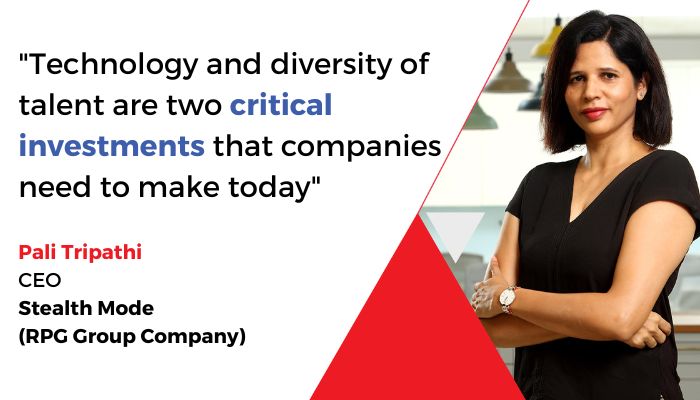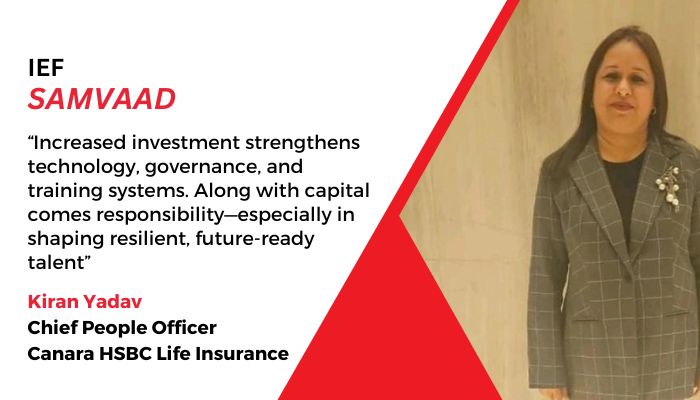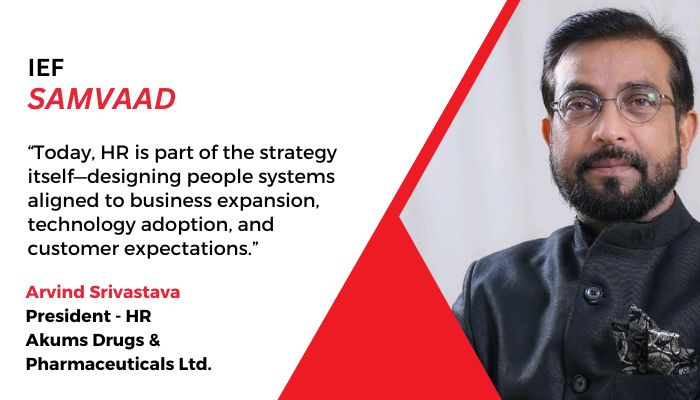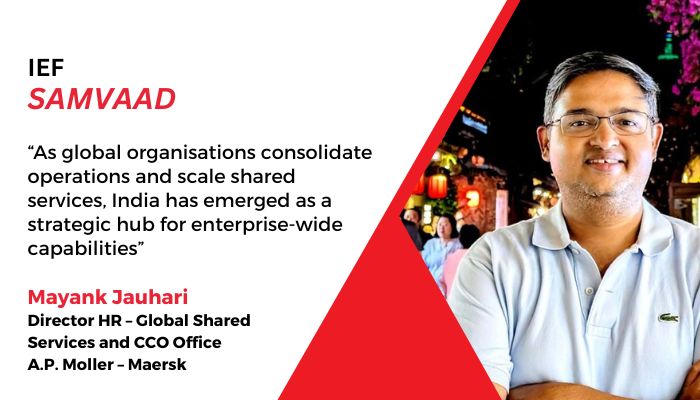Pali Tripathi, CEO, Stealth Mode (RPG Group Company), speaks to India Employer Forum about the participation of women in the workforce, moonlighting, quiet quitting, quiet firing, India’s compliance universe and more.
Q. Tell us a little about yourself.
Currently, I am the CEO of a new company under the RPG group umbrella. It is something that looks at future mobility areas. In terms of my education, I graduated in Psychology and moved to HR from Tata Institute of Social Sciences, Mumbai. Along the way, I have donned many hats. I started my career with HR, then did a little bit of post-merger integrations, core strategy, channel sales and now the CEO hat. That’s as far as my professional journey has been. Apart from work, I love spending time with my kid. I have a 4-year-old daughter. I love writing, I love books, so I do a fair amount of reading and, of course, travelling.
Q. There has been increased awareness in recent years of women in the workforce, yet there has been lesser participation of women in the workforce from 15 years back. What do you think has caused this, and what can we do to encourage more women into the workforce?
There’s been a lot of data on this, especially in the recent past after the World Bank report, and a lot of newspapers are talking about it. Any economy, as far as research goes, goes through that U-curve. As the economy does well, women’s participation goes low. Now, this has happened country after country, and this happens mainly because women’s employment typically starts as a need. It happens because you need to make ends meet. The money in the household is not enough, so the woman goes to work. The woman, at this stage, is not really going to work out of choice, but she’s going to work because they need more money at home. However, the moment the economy starts doing well, the woman is the first person to be withdrawn or to withdraw herself from the workforce.
Now, this is where it gets interesting. Ideally, after this has happened, women’s education and women’s awareness should ensure that women go back into the workforce. That is something that we are not doing; the discretionary participation in the workforce where a woman believes that her own financial independence is important, that she needs to put a job a part of her identity. That’s something that is so ingrained as a part of a cultural fabric that doesn’t take precedence. This happens purely because of the way our society has manifested itself in the way we have evolved culturally. So, while the economy is following a certain path, we’re not seeing women being part of that economic growth. They are still doing what they’re doing. So, all the women who are participating are really in informal jobs, so you can’t really get the numbers. The number of women who are in important positions or critical roles is not increasing, and this is really happening because the responsibilities aren’t changing.
Q. What are your views on topics like moonlighting, quiet quitting and quiet firing which have been trending of late?
There is this integrity of an employment contract, where if it is very clearly outlined that ABCD is not allowed, which you’re made to sign. However, if there is an agreement between an employer and an employee, and that the employee would like to pursue opportunities outside, and the employer is okay during the same working hours, then I see absolutely nothing wrong with it, and I believe that’s the way it should be. The ability to treat an employee like an adult is something that would be important, and that conversation should happen. So, what I see changing is more and more of these conversations becoming mainstream. We’ve not really had a lot of employees demanding something like that.
Typically, when you talk about moonlighting, people think moonlighting is just another source of income. Moonlighting can be about anything; it can be about another hobby, etc. So, as long as it is happening transparently with the employer, and the employer is okay, I think it’s alright. And I see that this will become one of the things that will be a part of employer branding. The way flexi-time, etc., became integral to attracting talent, I think in the war of talent, which is always something that is on, especially in the IT industry, this will become a differentiator for employers. If for specific roles they can go ahead and say this is something that we provide, I see there’ll be many takers.
Q. India’s compliance universe has more than 69,000 compliances that a business has to adhere to, out of which more than 26,000 have clauses for imprisonment. What is your view on this and how can the government help ease the compliance burden on employers?
A lot of work has already started on this; it shows in the ease of doing business index. We’ve moved significantly, but a lot of this needs to be done and needs to be done more speedily. So, while we have reduced the number of compliances to a great extent, we’ve also made it digitised. We’ve got these single portal appearances for MSMEs and one ration card, etc., which has been part of easing the compliance burden to some extent. However, a lot of this needs to be done. E.g., especially with small enterprises and startups, there must be this proactive outreach from the government to make them aware in the first instance because it’s not easy understanding the law of the land at any given point in time. So, you have these laws, and they keep changing. So, it’s not just the quantum of them; it’s also about how tenuous they are. It’d be one thing some day, and the next day it will be something else. This vast population of startups and companies who don’t have it. These are two employees, three employees, kind of companies; they aren’t aware of what’s happening. So, the government can do outreach programs to make them aware.
Secondly, what should be done is just the co-creation of these solutions; it doesn’t have to be top-down. We can create these industry circles, industry bodies that are coming together and saying that instead of these hundred laws, we need just one, and this is the portal through which it will happen. So, instead of one government body working on it, thousands of such circles across the country are working on different solutions relevant to those micro-level problems, enterprises, etc. Because there’s also a state angle to this whole thing, it’s not just an India-level thing. Even at a state level, there are a lot of compliances that are different. I think the more one can make the solution in micro or tech-enabled and speedy, the better our chances of not being proud of just being in that 60s in the ease of doing business, but getting into the top 10 or top 20 otherwise, it’s going to be a long journey for us.
Q. What is the most critical investment that companies need to make today to gain an unfair advantage in the long run?
These are two things. I think both have been a mainstay for a fairly long time. The first one is the technology and more technology, and more and more technology. Artificial Intelligence used to be a fancy word just two years back. The companies are doing it experimentally because these advisors tell them that they’ll miss out if they don’t do it. Now you have scalable solutions around AI that help a company either better reach the customer or faster reach the customer or understand the customer better, or sell a product better, etc. So it’s become pretty integral.
Similarly, you will see that everything that changes in technology, it would be really quick. So, you would think this will hit you five years hence, but hey, it would be just around the corner, six months away or one year away. That’s the one thing that would be extremely important: all companies would need to double down and triple down on technology relevant to their sector.
The second thing is the diversity of talent. And when I say diversity, gender is a big part of it, but so is sexual orientation, regionality, internationality, or the kind of skills you bring to the table. So, what’s becoming more and more clear is that the problems are going to become more and more complex. They will not be linear, so the solution we need will have to be through multiple hacks. It has to be from more than just that functional layer. If that is the kind of problem that will exist, then your teams must be built accordingly. And diversity is something that would become integral to building those solutions. You will not be able to solve a problem till you have talent representation that can look at that problem through that multi-dimensional net. So in my view, that’s something that organisations have to do repeatedly, consistently and at scale.
Watch the full interview: In conversation with Pali Tripathi | CEO | Stealth Mode (RPG Group Company)
About Pali Tripathi
Pali Tripathi is a multifaceted business leader with 16 years of proven track record in strategy, new business incubation & scale-up and profitable go-to-market for large consumer-focused businesses.Pali is currently the CEO of a new venture in the smart-mobility space under the RPG group. Before this role, she was in various leadership roles, such as Chief of Strategy, Business Head, and Director at organisations like HUL, EY, Booz and Ceat.
Disclaimer: All views expressed in the interview are purely personal and nothing to do with the policies of Stealth Mode or RPG Group Company.






